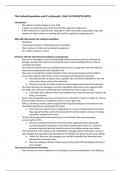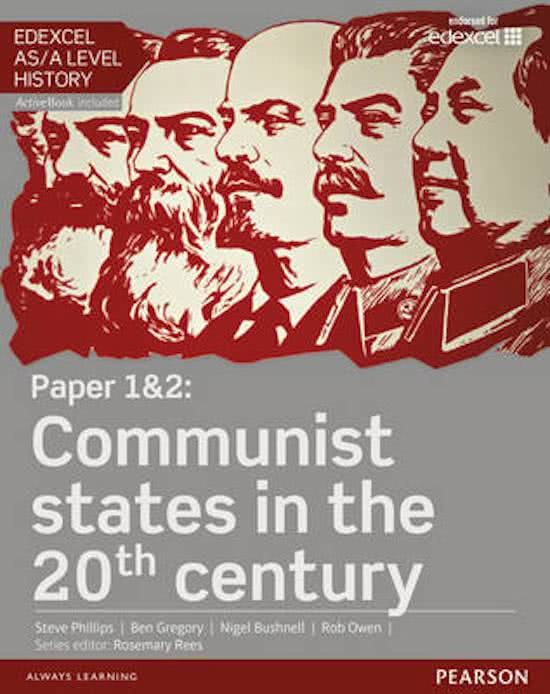The Cultural Revolution and it’s aftermath, 1966-76 COMPLETE NOTES
Introduction
- The cultural revolution began in may 1966
- It began as an internal purge of the Party by Mao against his opponents
- It then widened to a national mass campaign in which Mao used young people, especially
students to attack anyone or anything that could be regarded as opposing years
Why did Mao launch the cultural revolution
- Ideological
- Continuing revolution/ confirming peasant revolution
- Mao’s removal of rivals and removing his opponents
- Re creation of Chinese culture
Divisions with the CCP between ideologues and pragmatic
- Mao was an ideologue, he was uncomfortable with the measures taken to alleviate the
damage caused by the Great Leap forward because it mean admitting that his vision of
revolution had failed
- The measures introduced by Lie and Deng were seen as too pragmatic and Mao believed
they were moving towards that Capitalist road
- Mao was concerned that, despite members of the ruling class having lost their political
power, their attitudes still lived on in the assumptions and behaviours of people
o Mao believed that as long as these capitalist ideas remained embedded in arts and
culture then china could not be advanced
o Therefore, in order for China to advance these people would have to be advanced
- The divide between the ideologues and the pragmatists had become more apparent after
the 7000 cadre conference which had been summoned by Mao in January 1962
o It was after this conference that Mao withdrew from public life and was ‘replaced’ by
Deng, Lie and Zhou
- Deng’s view (pragmatist) can be summed up by his comment of ‘it did not matter if a cat was
black of whiter so long as it caught the mouse, it was a good cate
- Both Liu and the economic planners agreed with Deng that ideological compromises were
essential to get Chin’a economy back on its feet
o They were also critical of mass mobilisation as a means of advancing the economy;
they argued that this would only be possible if technical experts were put in charge
and polices imposed from above
- To Mao, these approaches were unnecessary as he through China was recovering
economically by 1962
o Mao had continued his efforts to hit back at the pragmatists by launching the
socialist education movement in 1963 which preached the virtues of a collective
economic approach and also aimed to root out corruption among rural cadres
- Mao wanted this to be another mass mobilisation campaign which could renew a sense of
class struggle among peasants by allowing them to identify and attack corrupt party officials
o Under Liu’s direction, the campaign was centrally controlled and thousands were
executed for economic crimes
o Mao was unhappy with the methods used as they lacked the ideological element of
class struggle
The quest for permanent revolution
- Mao was keen on mass mobilisation as a technique to prevent old attitudes from drifting in
, - Mao felt that within Soviet Russia, Khrushchev had squandered Lenin’ legacy and betrayed
the revolution by becoming too friendly with the West
- Mao was also aware that younger members of the party had not been tested; they were too
young to have participated in the long march, civil war or the three and five antis.
o He believed they needed direct experience of revolutionary struggle
Attacks on bureaucracy
- Mao also wished to undermine the bureaucracy
o He believed that the new bureaucracy had become self satisfied elite who were only
motivated due to the privileges of power
- The cultural revolution can be seen as an act of vengeance against the urban intellectuals
who had critisced the Great Leap Forward
Divisions with the CCP between supporters and opponents of Mao’s policies
- Mao’s main supporters were Lin Biao (head of the PLA), Mao’s wife Jiang Qing, Kang Shang
and Chen Boda
- Mao’s policies were opposed by Liu Shaoqi (head of state since 1958) and Deng Xiaoping,
along with moderate economic planners such as Chen Yun and Bo Yibo
- Until the 7000 cadre conference on 1962, Liu had widely been seen as Mao’s chosen
successor
o However, at a party conference in 1964, Mao openly accused Liu of choosing the
‘capitalist road’ while accusing Deng of trying to run an independent kingdom
o Liu and Deng had too much support in the Politburo and the wider party for Mao to
risk confronting them head on
- Mao felt confident enough to make a move against his opponents in 1966
o Taking advantage of Liu’s absence due to a foreign, Mao got Lin Biao, Kang Shang and
Chen Boda to back his proposal that Peng Zhen should be removed from his post
- Shortly after this, Mao set up the Central Cultural Revolution group (CCRG) which was given
the direct task of directing the cultural revolution
o It was dominated by Mao’s supporters including the Gang of Four
- At this point, Liu and Deng still appear to have believed that they were in control of events
and continued to have the support of Mao
o They though Mao was launching a campaign to remodel culture rather than
themselves becoming the targets
- In July 1966, Mao completed his comeback to the front line of politics in the highly publicised
swim in the Yangtze River at Wuhan
o This demonstrated he was physically ready for showdown as well as by choosing
Wuhan it was a reminder of the revolution and republics birth
o He then retuned to Beijing and forced Liu and Deng to make self criticisms before the
central committee for their errors
- Then on the 18th August 1966, the first of the 8 rallies of Red guards was held in Tinanamen
square
o The Red guard were unleashed to attack the four olds and the cultural revolution
began
How effective were the Red Guards in carrying out the cultural revolution
Mao’s hold on young people
- Mao’s successes in manipulating the young owes much to the efforts that had gone into
developing his personality cult since the early 1460s
o By 1966, carrying a copy of the Little Red Book, complied by Lin Biao had become a
social necessity





